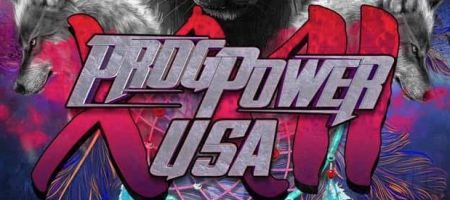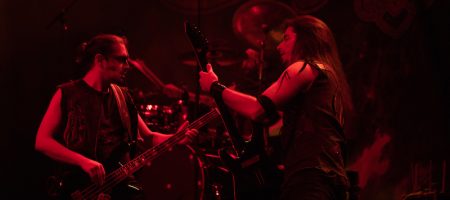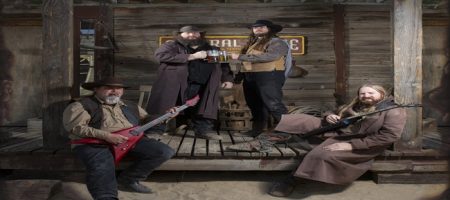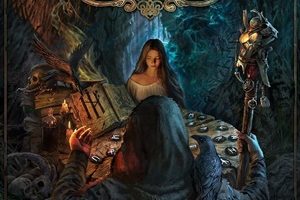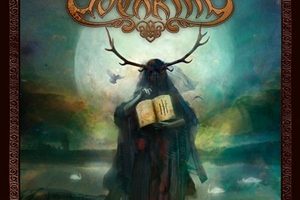Elvenking – All Hail the Runes
Sunday, 15th September 2019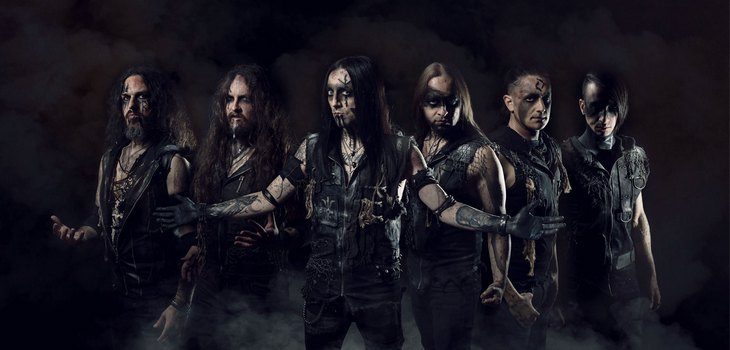
Forming in 1997, Italian band Elvenking have been harnessing a love of power and folk metal throughout their career. As of late, they’ve been on a serious hot streak if you will, capturing a style musically and lyrically that is endearing, catchy, and captivating all the same. 2014’s The Pagan Manifesto seemed to be a turning point for the band, and with their tenth studio album Reader of the Runes – Divination, the group take a bold step forward in developing their first concept album. As you will discover in this talk with vocalist Damna, it’s actually the first in a series of works – the sextet confident that the Elvenking legions are ready to take a trip with them into another world.
Coming back after conquering appearances at the Sabaton Open Air festival in Sweden, Rockharz in Germany, and Povorock in their home country among others, we got the chance to Skype with Damna about the varied songwriting process this time around, the visual / image components that enhance the output, the importance of The Pagan Manifesto to realigning the band’s style, and thoughts on the Italian scene plus the state of the metal industry today.
Dead Rhetoric: Tell us your thoughts on the recent summer festival run for Elvenking – how was the reception to the band, and what were some of the standout moments for you and the band?
Damna: Of course it has been really good. We had a chance to play some very big metal festivals here in Europe. The reaction from the fans is always surprising for us because it’s always overwhelming when you play those big festivals on huge stages and still have a lot of people that are supporting the band, singing along to your songs and having a good time with our music. We are always that small band coming from a small place in Italy, it’s always very surprising and we are very happy for that. It has been a great run, a very good turn of events for Elvenking and we are very happy for this.
Dead Rhetoric: Reader of the Runes- Divination is the tenth Elvenking studio album – and the first in a series storyline for the group. Inform us about the genesis of the story, and how you feel about the songwriting and performances for this album in relation to your previous output?
Damna: Of course as you may have read in the biography and so on, you may have seen that this is the first time we are doing something like this. We’ve always been interested in doing something like this, a concept story in an album, but we never had the right idea. We’ve always been very selective when it comes to ideas and things that we want to write about. We’ve never had a strong idea that could carry on a story in an album. We have always been interested in concept albums in metal, bands like King Diamond, Savatage, or the great classics where you could live something that could go beyond the music, a whole new world where you can escape for one hour or so and be able to have a complete experience, not just with the music but also the other world.
We’ve been wanting to do something like this since the beginning (of our career), but this time we had the right idea. Every time when we start to write the songs for an album, myself and Aydan the guitarist get together, meet and brainstorm all the ideas that we have both musically and lyrically. This time we thought it was the right time to do a concept album, so we spent time discussing the idea – the idea got bigger and bigger, so we decided that we couldn’t fit all of the story in one album. We had to have more chapters and more parts of the story – so there will be at least three parts, and this is the first.
The songwriting, it has been a little bit different this time because usually we meet all the time, we go through all the musical ideas and develop the songs together. This time we had to keep in mind that we had a story going on, we had to collaborate even more with the songwriting because we also had to take care of the lyrics. It has been really interesting, the process. Even more binding the two of us together, creating something. This first part, you will get to know the characters, we introduce the background of the story and the main characters. Each song is talking about the different characters of the story, and how it will be developed, how the characters are linked together – you will discover in the next parts.
Dead Rhetoric: Will there be a possible future book developed out of this story – and do you believe this opens up different promotional avenues through other mediums like the videos that will come out?
Damna: Actually we’ve done something like this in the box set, the limited edition released with the album. We added a book there, it helps the listener go more into the story. The characters are described even better within this book. We also have some tarot cards, some runes, some objects that could come from the world of the story. For those interested we wanted to have something more, some objects, a map that can help you locate all the characters within the story. We’ve been successful in letting the listener and the reader just feel more inside of the story and the concepts.
If in the future we will have a book or something more, videos that could depict even more what’s going on in the story, only time will tell. We’ll have to see if this album will be successful or not. I’m confident that we will keep on doing something like the limited box set where we can give the fans some objects and insight into the concept even more.
Dead Rhetoric: Was it a challenge as a result of the concept to decide which songs would be released first as singles/videos to give the listeners a preview into the album?
Damna: Yes, definitely. It was really hard. It is so difficult to choose the singles when you are so involved in the music and the making of the album. We let AFM Records decide this time- we told them to listen to the album and decide which are the strong songs. It didn’t matter if the lyrics were going to spoil the story a little bit or not, they chose the right songs.
Dead Rhetoric: At this point when it comes to Elvenking, how do you stay fresh and relevant with your output without necessarily becoming stagnant or repeating yourselves? Are you conscious of satisfying yourselves as musicians while balancing the expectations from your fans?
Damna: This has been an issue since the beginning. The fact of trying not to repeat ourselves, trying not to make the same album and the same songs all the time. We’ve been frustrated even with this aspect. We’ve made some albums in the middle part of our career, even changed too much and the listeners were confused by what we are doing. We made some albums where one was the opposite of the other – one is very heavy, and the other very melodic. In that transition, we lost a little bit of our identity.
Fortunately with The Pagan Manifesto album which was released in 2014, we decided to get back our identity. It was a natural development of our sound, we really needed to find the core of our music once and for all. With that album, we finally found it- after that album we are developing and trying to do new things but within the boundaries of our sound and our identity. I think we are very happy with this, we’ve found our playground, our real identity and its there that we are finding different solutions that are not going to push the boundaries too far. At the moment we are really happy with what we are doing.
Dead Rhetoric: Discuss the importance of having strong imagery and the visuals that Elvenking incorporates to get across the themes and messages you deliver for the band?
Damna: It’s very important. As I was saying earlier, it’s a very important thing when it comes to this kind of music. It gives the fan the idea of being inside a different world, escaping reality for a little while. Not just with the music, or the songs – by creating something that is a little escape for an hour and the length of an album. With strong artwork, the stage wear we have, the makeup – it’s staying true to the motive of the songs, the lyrics, and being able to create something that goes beyond a simple album or a simple bunch of songs. Adding something visual to what you are listening to so that music like this, Elvenking, it fits this kind of imagery and helps to express our ideas best.
Dead Rhetoric: If you were to take an honest assessment of the career arc of Elvenking, what would you say are some of the key standout moments where you knew the band was heading in the right direction and taking a step forward either creatively, personally, or in terms of popularity – be it specific albums, songs, videos, or touring/ festival situations?
Damna: As I said, The Pagan Manifesto album was a point in our career where we really knew that we did the right thing. We knew it in our guts, it’s not just a single reaction of the people after we released it, it was while we were making it, we knew it was right. And then of course, our fans, metal fans and listeners were telling us the same (thing), it was our best album, Elvenking was expressing themselves the best. And then after that, all the other good things for Elvenking – the bigger festivals, touring, that’s a big turning point for us.
Dead Rhetoric: What are some of your bucket list items to check off that you would like to see Elvenking achieve that haven’t been accomplished as of yet?
Damna: There are many still, I think. What can I say… I don’t know actually. I’ve always been not wanting to do things, the great thing was discovering that we could be able to do those things. If you know what I mean. It was not anticipating something and then achieving it that made us happy. It was waking up one day and finding an email that said, you are playing at Wacken this year. These are the kind of things that really make us happy and they show the band is really growing.
Dead Rhetoric: Do you can a sense of pride when you see homegrown acts like Rhapsody and Lacuna Coil achieve international acclaim as artists?
Damna: Of course. It puts a smile on my face when I see these bands have great success out of our country. Really good bands deserve the success. This is reinforced by the fact that in Italy it’s really hard to have bands that are able to be so popular abroad. It’s really difficult. In Italy, the metal scene is always so difficult to understand. There are a lot of good bands, but they don’t gain that much attention from people, from those who listen to music. When I see a band like that make it, I’m happy. A band like Fleshgod Apocalypse for example, they are popular right now in the states, it’s good.
Dead Rhetoric: How would you assess the state of the metal music industry today – and what are some things you believe fans and consumers could do to keep things on the right track?
Damna: I think the metal scene nowadays is pretty strong. There were years where I was confused, and where the metal scene was going and what was going on. Maybe because of the digital revolution that happened, but over the very last years things are finding themselves in the right position for the market. The digital services are finally being recognized, there is some order in it that years ago was really missing. The market is finally growing again as it was back in the early days – in a different shape, maybe. It’s really working now. We see it now in our results and what we are doing, digitally and physically. Things have finally found a balance, and fortunately we can gain a little bit from this and not be desperate for sales like five or six years ago.
Also seeing these metal festivals, these big bands now are gaining a lot of fans. Bands like Amon Amarth, Sabaton, and Powerwolf for example, these are three of the biggest names in the scene for festivals. There are a huge amount of people that are going out for their shows, and that’s really good.
Dead Rhetoric: You mention in a previous interview your nerd tendencies and love of old school PC games – what have been some of your latest finds or games that you go down the rabbit hole to play, and how do you feel about the state of gaming today?
Damna: Well, actually with gaming, things have changed a little bit. The old school games, I’m a huge fan of the point and click adventures. As you can imagine if you know the genre, things are not so good at that moment. There aren’t as many point and click adventure games as there were back in the days. It’s a pity for me, I like other kind of games, so I find something to play with all the time.
The one thing that I always love are stories, well-written games with well-written stories. Lately there are a lot of games that are focusing on the story, and that makes me happy. One of the latest games I love lately is Life Is Strange, one of the coolest things I’ve played, seen, or read – it is just like a movie. That was one of the best ones I’ve played in the current years.
Dead Rhetoric: What are some of the common mistakes you see younger bands making in the scene that you wish you could help them avoid or think about differently?
Damna: There are a lot of things I’ve seen in young bands when we play together with them. We always meet new bands and new people. One thing that I would like for them to avoid is arrogance. Having an arrogant attitude. That is one of the worst things when you try to create your own little spot in this market, in this scene. There are a lot of bands that start with that kind of shitty attitude, and that’s the main thing you should avoid.
Dead Rhetoric: Where do you see the major differences with Elvenking in the studio versus Elvenking in terms of live concerts/performances? Do you favor one aspect over the other – or gain equal enjoyment out of both?
Damna: We enjoy both. They are really different. Especially for myself and Aydan – being in the studio is following every aspect, every note, every minute of the music. On one side, it’s really interesting and stimulating because it gives you the chance to live the music that you write, see it under every aspect and being able to shape it as we want. On the other side, it’s really hard work – it’s difficult but it pays off when you have the final results and finally see the album turns out good. The live side is where we express all together, bring those songs that we worked hard for, we bring them to the people and see the people enjoy them. They are like two sides of the same coin, we enjoy them both very much.
Dead Rhetoric: With ten studio albums to choose from, does it present any difficulties in coming up with setlists?
Damna: Well, I think it can. You want to please the fans and try not to leave behind some songs that they’ve always enjoyed. With the latest albums, a lot of the cool live songs come from there – it’s great to put together songs from these latest three albums and have a very energetic show that we haven’t had before. The small connections with the fans, people can sing even more, singalong choruses. We have a lot of songs, but we have the right way to shape the setlists.
Dead Rhetoric: How do you and Marco balance out the activities with Elvenking and Hell in the Club – your heavy metal/hard rock act that has recorded and released four albums to date?
Damna: So far we’ve been looking at the schedule of both band’s activities. There’s always been the focus on Elvenking for myself. With Andy the bass player for Hell in the Club, he’s also the bassist for Secret Sphere, so he always has the main focus on them. It’s been pretty easy to know when both bands were stopping for a break so we could open a spot for Hell in the Club to start writing songs and recording albums or doing some shows. Hell in the Club is an important band, but the main focus is always on Elvenking for me so we know when we can have a free spot and don’t do things altogether.
Dead Rhetoric: How do you see the next year shaping up for Elvenking in support of the record? Are there hopes at some point to be able to hit North America – even if it’s on a festival or short touring basis?
Damna: North America is for sure one place that we want to come to. It’s always a little bit difficult with the travel, the flights and so on. We really hope to find the right partner that can help us come there and do at least a small tour. At that moment the program is to have a South American tour in October, play Mexico and five countries in South America. We will make a couple of European tours in 2020, January we will do the first one, maybe April-May for the second one. As a co-headliner or headlining, we are still seeing about things. We want to promote this album as much as we can, and we are seeing since last May touring Europe as a headliner has been successful, so now we know that we can do it. We will do one small headlining tour and maybe a bigger co-headlining tour to cover all of Europe. Hopefully we will come to North America one day, I really hope so.











